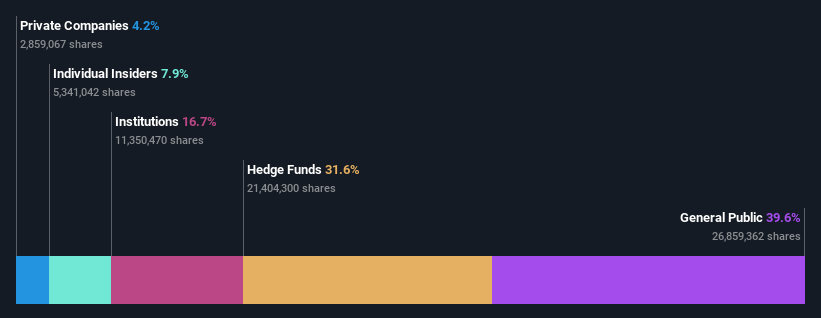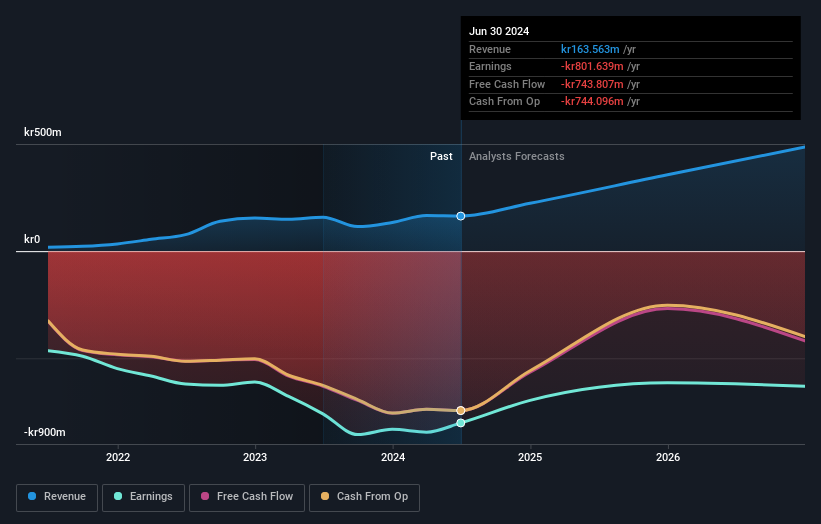Hansa Biopharma AB (publ)'s (STO:HNSA) biggest owners are individual investors who got richer after stock soared 15% last week

Key Insights
- Hansa Biopharma's significant individual investors ownership suggests that the key decisions are influenced by shareholders from the larger public
- 51% of the business is held by the top 8 shareholders
- 17% of Hansa Biopharma is held by Institutions
Every investor in Hansa Biopharma AB (publ) (STO:HNSA) should be aware of the most powerful shareholder groups. We can see that individual investors own the lion's share in the company with 40% ownership. Put another way, the group faces the maximum upside potential (or downside risk).
Clearly, individual investors benefitted the most after the company's market cap rose by kr403m last week.
Let's take a closer look to see what the different types of shareholders can tell us about Hansa Biopharma.
Check out our latest analysis for Hansa Biopharma

What Does The Institutional Ownership Tell Us About Hansa Biopharma?
Institutional investors commonly compare their own returns to the returns of a commonly followed index. So they generally do consider buying larger companies that are included in the relevant benchmark index.
Hansa Biopharma already has institutions on the share registry. Indeed, they own a respectable stake in the company. This suggests some credibility amongst professional investors. But we can't rely on that fact alone since institutions make bad investments sometimes, just like everyone does. When multiple institutions own a stock, there's always a risk that they are in a 'crowded trade'. When such a trade goes wrong, multiple parties may compete to sell stock fast. This risk is higher in a company without a history of growth. You can see Hansa Biopharma's historic earnings and revenue below, but keep in mind there's always more to the story.

It would appear that 32% of Hansa Biopharma shares are controlled by hedge funds. That worth noting, since hedge funds are often quite active investors, who may try to influence management. Many want to see value creation (and a higher share price) in the short term or medium term. Redmile Group, LLC is currently the largest shareholder, with 19% of shares outstanding. Meanwhile, the second and third largest shareholders, hold 12% and 4.0%, of the shares outstanding, respectively.
We did some more digging and found that 8 of the top shareholders account for roughly 51% of the register, implying that along with larger shareholders, there are a few smaller shareholders, thereby balancing out each others interests somewhat.
While studying institutional ownership for a company can add value to your research, it is also a good practice to research analyst recommendations to get a deeper understand of a stock's expected performance. There are a reasonable number of analysts covering the stock, so it might be useful to find out their aggregate view on the future.
Insider Ownership Of Hansa Biopharma
The definition of an insider can differ slightly between different countries, but members of the board of directors always count. The company management answer to the board and the latter should represent the interests of shareholders. Notably, sometimes top-level managers are on the board themselves.
Most consider insider ownership a positive because it can indicate the board is well aligned with other shareholders. However, on some occasions too much power is concentrated within this group.
Our most recent data indicates that insiders own some shares in Hansa Biopharma AB (publ). It has a market capitalization of just kr3.1b, and insiders have kr246m worth of shares, in their own names. This shows at least some alignment. You can click here to see if those insiders have been buying or selling.
General Public Ownership
With a 40% ownership, the general public, mostly comprising of individual investors, have some degree of sway over Hansa Biopharma. This size of ownership, while considerable, may not be enough to change company policy if the decision is not in sync with other large shareholders.
Private Company Ownership
We can see that Private Companies own 4.2%, of the shares on issue. Private companies may be related parties. Sometimes insiders have an interest in a public company through a holding in a private company, rather than in their own capacity as an individual. While it's hard to draw any broad stroke conclusions, it is worth noting as an area for further research.
Next Steps:
While it is well worth considering the different groups that own a company, there are other factors that are even more important. Consider for instance, the ever-present spectre of investment risk. We've identified 5 warning signs with Hansa Biopharma (at least 1 which can't be ignored) , and understanding them should be part of your investment process.
But ultimately it is the future, not the past, that will determine how well the owners of this business will do. Therefore we think it advisable to take a look at this free report showing whether analysts are predicting a brighter future.
NB: Figures in this article are calculated using data from the last twelve months, which refer to the 12-month period ending on the last date of the month the financial statement is dated. This may not be consistent with full year annual report figures.
Valuation is complex, but we're here to simplify it.
Discover if Hansa Biopharma might be undervalued or overvalued with our detailed analysis, featuring fair value estimates, potential risks, dividends, insider trades, and its financial condition.
Access Free AnalysisHave feedback on this article? Concerned about the content? Get in touch with us directly. Alternatively, email editorial-team (at) simplywallst.com.
This article by Simply Wall St is general in nature. We provide commentary based on historical data and analyst forecasts only using an unbiased methodology and our articles are not intended to be financial advice. It does not constitute a recommendation to buy or sell any stock, and does not take account of your objectives, or your financial situation. We aim to bring you long-term focused analysis driven by fundamental data. Note that our analysis may not factor in the latest price-sensitive company announcements or qualitative material. Simply Wall St has no position in any stocks mentioned.
About OM:HNSA
Hansa Biopharma
A biopharmaceutical company, engages in development and commercialization of treatments for patients with rare immunological conditions in Europe and the United States.
Moderate with limited growth.


